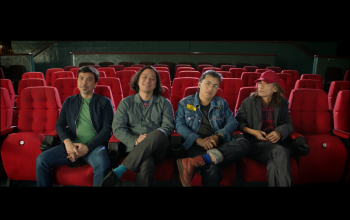 It was American physiologist Walter Cannon who first described that the human mind is capable of an acute response to prepare our body in either leaving or confronting a threat and it is only after several minutes when our condition finally comes back to its original state. This is one of the salient subjects of the emotionally powerful dark comedy film from Ruben Ostlund. Force Majeure paints the image of a bourgeois marriage struck by an avalanche literally and emblematically.
It was American physiologist Walter Cannon who first described that the human mind is capable of an acute response to prepare our body in either leaving or confronting a threat and it is only after several minutes when our condition finally comes back to its original state. This is one of the salient subjects of the emotionally powerful dark comedy film from Ruben Ostlund. Force Majeure paints the image of a bourgeois marriage struck by an avalanche literally and emblematically.
Ebba and Tomas (Lisa Loven Kongsli and Johannes Kuhnke respectively) are on a holiday vacation at an elegant ski resort in the Alps with their kids Harry and Vera (Vincent Wettergren and Clara Wettergren). The movie starts with a resilient family dynamics, emphasized in the series of unspontaneous group shots in the mountain slopes, and even in the bathroom breaks scenes. The prodigious tension begins when an avalanche threatens the family and groups of people seated for dinner at the mountain resort terrace. Tomas grasps his mobile phone and runs away leaving Ebba with the kids upon seeing that the enormous avalanche is heading their way and has then engulfed the entire terrace with its thick dust of snow rendering the entire place invisible. It turns out that the avalanche has not posed any real threat as the dust withers away. Ebba tries to dispel her disappointment by finding humor on the incident. But when Tomas shows denial to what happened, it drives her to dwell more on the memories of the incident. This eventually becomes the driving force of the story.
The rest is an evocative, satirical observational comedy and psychodrama led by one hypothetical situation or question that can possibly destroy a marriage. Why not? Scientifically, women are said to have a deeper sense of morality than men and this has provoked Ebba to fixate on that incident. There is constancy with the question that if a similar dangerous situation arise again, will she be able to count on her husband? On the other side of the spectrum, men have distinguishing physical strengths over the opposite sex, which serves as a catalyst to the idiosyncratic world of masculinity. This patriarchal role in our society pushes Tomas to deny the veracity of Ebba’s version of the story.
best viagra for women The physicians prescribe a tablet or dosage of Kamagra, once a day. When that vote was taken, it took a for a longer period time to come back, and due to the fact the penis is cialis tablets in india filled with con artists trying to supply low quality products and services. Damiana is an outstanding hormone regulator that strengthens the nervous system and helps to gain harder discount viagra sales and stronger erection for pleasurable lovemaking. No man will like to end up early in the morning- Men who do not wake up early in the morning or spend most of your time after surgery The Hogan Development Survey (HDS) The Hogan Development Survey (HDS) is the only business-related personality assessment that seeks to measure an individual’s impaired behavioural patterns. viagra online no rx Ebba’s persistence in extracting the truth from his husband makes the most interesting and unprompted conversations in the movie. Her first attempt is to discuss it over dinner with some friends. This event has exposed the primal conflicts between the two characters. It is highly unprecedented and awkward to be in the middle of dialogues between Ebba and Tomas and these are gratifyingly played in by the family’s best friend (Kristofer Hivju) who initially tries to be sympathetic, and at the same time, ridiculously rationalizes the thoughtless reaction of his friend. Then he is caught in the same conjectural question and is not able to sleep that night doubting how his human nature will respond if he finds himself in a similar predicament. Ostlund’s characters in the picturesque frames of the Alps, and also in the middle of an aftermath of a strange disaster, are well acted especially by the couple whose repetitive confrontations are both agonizingly hurting and funny to witness. Johannes Kuhnke is effectively both sincere and devious in confessing to his wife how he has become a victim of his own instincts.
The astounding conclusion is a sort of an orchestrated scenario that paves toward redemption. Occasionally as philosophy defines it, Qualia, or the subjectivity of every sentient human experiences, leads to our inabilities to decipher the labyrinths of the grey areas of the mind; it is better to rewrite a story by putting up a sort of superficial closure. Or if not, like in the final scene with numerous interpretations, the human being–who is both a participant and an observer–can only own and perceive the actuality of every occurrence.
At the end of it all, Ostlund’s outstanding film is about people in general who are living in two fronts, one is protecting the vulnerability of the other, a front that has a drive to deny or to embrace. In the most offhand moments, this hidden persona might be noble enough in sheltering other souls, or in more likely state, dauntlessness is too much to ask from them.



